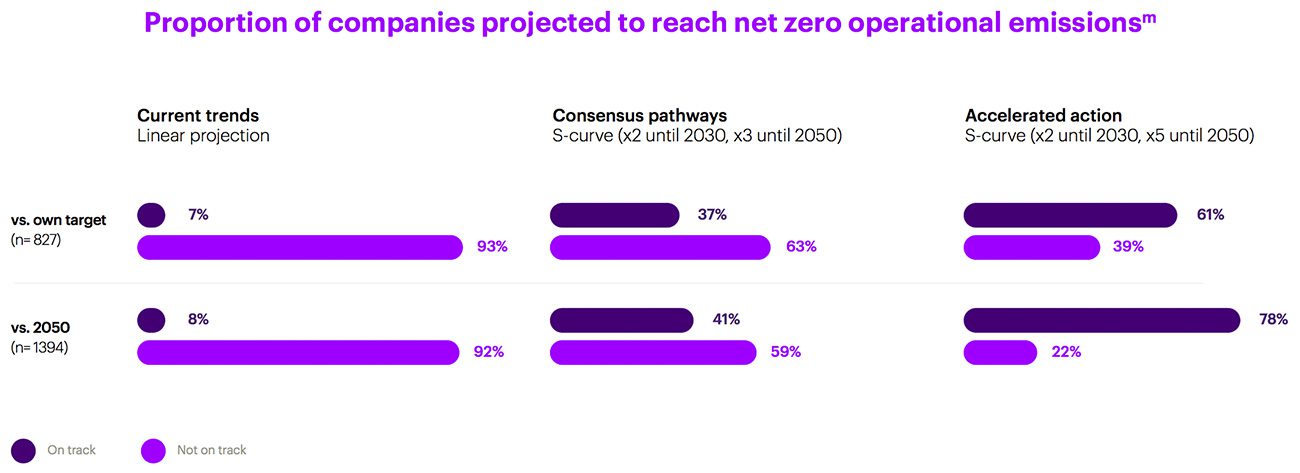A growing number of the world’s largest businesses are keen to be seen as committed to net zero drives, with one third having publicly unveiled campaigns to downscale emissions. But a new report suggests nine-in-ten are struggling to live up to their own hype, with the majority destined to miss their goals even if they double the pace of their emissions reductions by the end of the decade.
As consumers increasingly demand more from businesses in terms of sustainability, the business case for greening a company has never been clearer. With over one-third of consumers continue to suggest they would spend more on products that were sustainably produced, a growing trend which has led investors to suggest if they perceive companies to be dragging their feet on ESG matters, they will divest from them.
As a result, companies have been committing to a PR assault – joining a growing clamour to prove their green credentials to current or potential customers. A new study from Accenture has found that 34% of the world’s biggest corporate entities have set net zero targets. Moreover, 84% of companies stated intentions to increase investments in their sustainability initiatives before the end of 2022.

Commenting on that progress, Jean-Marc Ollagnier, CEO of Accenture for Europe, said, “Amid global economic, political and environmental disruption, more companies than ever before have publicly committed to largely decarbonising by around 2050. This heightened ambition is encouraging, but it is also clear that a steep acceleration of emission reductions is required.”
That is because, for all this apparent good will toward greening the economy from leading firms, Accenture has also found a worrying lack of progress on the pledges already made. By the firm’s reckoning, just 7% of companies are presently on track to achieve their net zero targets for scope 1 and 2 emissions at the observed rates of change.
Even shifting the goalposts to assume all targets were for 2050 does little to improve this. By 2050, Accenture anticipates that just 8% will have met their net zero targets. Even in a scenario where companies accelerated emissions reduction to twice their present rate in the years leading to 2030, meanwhile, 59% would still miss the 2050 deadline.

While Ollagnier added in his statement that he believed the importance of “maximising value” from things like “digital and certain renewable energies… like hydrogen” could be critical to overturning this, there will be many looking at these figures, wondering how long the world can afford to leave the net zero transition to the free market. With scientists sounding the alarm that time to limit global warming to a best-case scenario of 1.5C is running out, greater levels of net zero regulation seem likely to become a more prominent talking point in coming years.
This is especially the case for the industries who are furthest behind on the net zero journey – which also seem to be the biggest polluters. ‘Natural resources’ – a super-sector which includes agriculture, forestry, mining, and oil and gas extraction, has already set the majority of its own net zero targets for 2050. But even this window is not enough for the sector, which by Accenture’s reckoning could take until after 2060 to meet its targets. Similarly; energy, chemicals and consumer goods and services could take the best part of an extra decade to be ‘net zero’ – contributing years of hugely damaging emissions as climate change deepens.
“Now is perhaps a tougher time to be a CEO than any stage in the recent past, in particular, attempting to square the circle between sustainability commitments, inflationary and recessionary pressures and the need to deliver both shareholder and stakeholder value,” said Peter Lacy, Accenture’s global Sustainability Services lead and chief responsibility officer. “This report shows… a time when capital markets, governments and other organisations will create even more pressure to deliver on targets set through transparency, comparability and consistency.”




